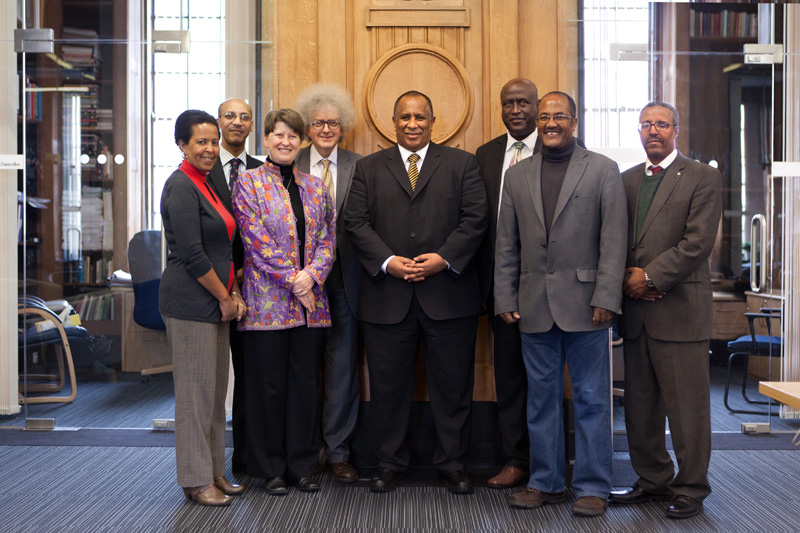University of Nottingham strengthens links with Ethiopia
March 14, 2012
 The University of Nottingham’s links with Ethiopia have been strengthened by a high-level visit from the African country.
The University of Nottingham’s links with Ethiopia have been strengthened by a high-level visit from the African country.
His Excellency Berhanu Kebede, Ambassador of the Federal Democratic Republic of Ethiopia, led a delegation to the University to sign two new agreements on teaching and research.
The Ministry of Education and the University of Nottingham reached an agreement on providing for the development of Higher Education in Ethiopia through jointly funded scholarships by the provision a joint Ethiopian Ministry of Education and University of Nottingham Developing Solutions Scholarships.
Five full tuition scholarships will be provided for young Ethiopian academics over the next five years, under the University of Nottingham’s Developing Solutions programme.
The scholarships are targeted at outstanding researchers in Ethiopia who will undertake one-year research programmes in subject areas that will help to advance the development of their own country.
They will work with some of Nottingham’s world-leading researchers – in fields such as biotechnology, biochemistry, engineering, health sciences and plant science – before putting their new knowledge to use in the development of Ethiopia. The first students are expected to start in September 2012.
Source of inspiration
His Excellency Berhanu Kebede said: “It is a great pleasure for us to build on the momentum and engage further in wider co-operation with the University of Nottingham which has been a source of inspiration for a number of Ethiopian academics.”
The Ambassador was accompanied by Professor Admasu Tsegay, President of Addis Ababa University, and Professor Masresha Fetene, Vice-President.
The visit, on March 13th, also saw the signing of a Memorandum of Understanding (MoU) between the University of Nottingham and Addis Ababa University. This will build on historically strong links in the area of Green Chemistry, where there are already a range of joint projects underway led by Professor Martyn Poliakoff CBE FRS in Nottingham and Dr Nigist Asfaw in Addis Ababa.
Green Chemistry — a field in which Nottingham is a world leader — focuses on more sustainable ways of creating chemicals, and is now regarded as one of the major routes to more environmentally-friendly production of the chemicals that underpin modern society. Nottingham staff were instrumental in helping to introduce Green Chemistry to Ethiopia.
The latest MoU will seek to promote further collaboration in the area of staff and student exchange and research collaboration.
Nottingham and Ethiopia
The strong relationship between The University of Nottingham and universities in Ethiopia goes back almost a decade. Ethiopian students are now studying in Nottingham, and Nottingham graduate Dr Ignacio Villar was formerly a lecturer at Addis Ababa University. Dr Pete Licence, Associate Professor and Reader in Chemistry at Nottingham, is Adjunct Professor in Addis.
Professor Sebsebe Demissew, keeper of the National Herbarium in Ethiopia, received an honorary doctorate from Nottingham in 2010 and is an Honorary Professor at the University’s School of Biosciences.
Professor Christine Ennew, the University’s Pro-Vice-Chancellor for Internationalisation, said: “Higher education in Ethiopia is expanding rapidly and has a key role to play in the country’s economic and social development. We have welcomed a number of outstanding students from Ethiopia in the past and we are now in a position to continue this on a systematic basis under the banner of our flagship “Developing Solutions” scholarship scheme.”
The work of Nottingham academics with colleagues in Ethiopia began with a chance meeting between Professor Martyn Poliakoff and scientists from the University of Addis Ababa, while Martyn was on holiday in Ethiopia in 2003.
Today, Green Chemistry is sufficiently developed there to enable African scientists to participate more fully in the search for new chemicals, processes and techniques that could impact on millions of people.
Much current research is focused on the search for renewable feedstocks and more environmentally acceptable solvents as replacements for petroleum-based products. This makes Green Chemistry particularly relevant to the needs of African countries such as Ethiopia, faced with an increasing demand for chemicals, little or no indigenous oil, and rapidly expanding populations.
Professor Poliakoff has been instrumental in developing links between Nottingham and Addis Ababa through staff visits, conferences, workshops and collaborative research.
More information is available from Tim Utton, Deputy Director, Communications, University of Nottingham on +44 (0)115 846 8092.
Notes to editors: The University of Nottingham, described by The Sunday Times University Guide 2011 as ‘the embodiment of the modern international university’, has 42,000 students at award-winning campuses in the United Kingdom, China and Malaysia. It is also the most popular university in the UK by 2012 application numbers, and ‘the world’s greenest university’. It is ranked in the UK's Top 10 and the World's Top 75 universities by the Shanghai Jiao Tong (SJTU) and the QS World University Rankings.
More than 90 per cent of research at The University of Nottingham is of international quality, according to the most recent Research Assessment Exercise. The University aims to be recognised around the world for its signature contributions, especially in global food security, energy & sustainability, and health. The University won a Queen’s Anniversary Prize for Higher and Further Education in 2011, for its research into global food security.
Impact: The Nottingham Campaign, its biggest ever fund-raising campaign, will deliver the University’s vision to change lives, tackle global issues and shape the future.
